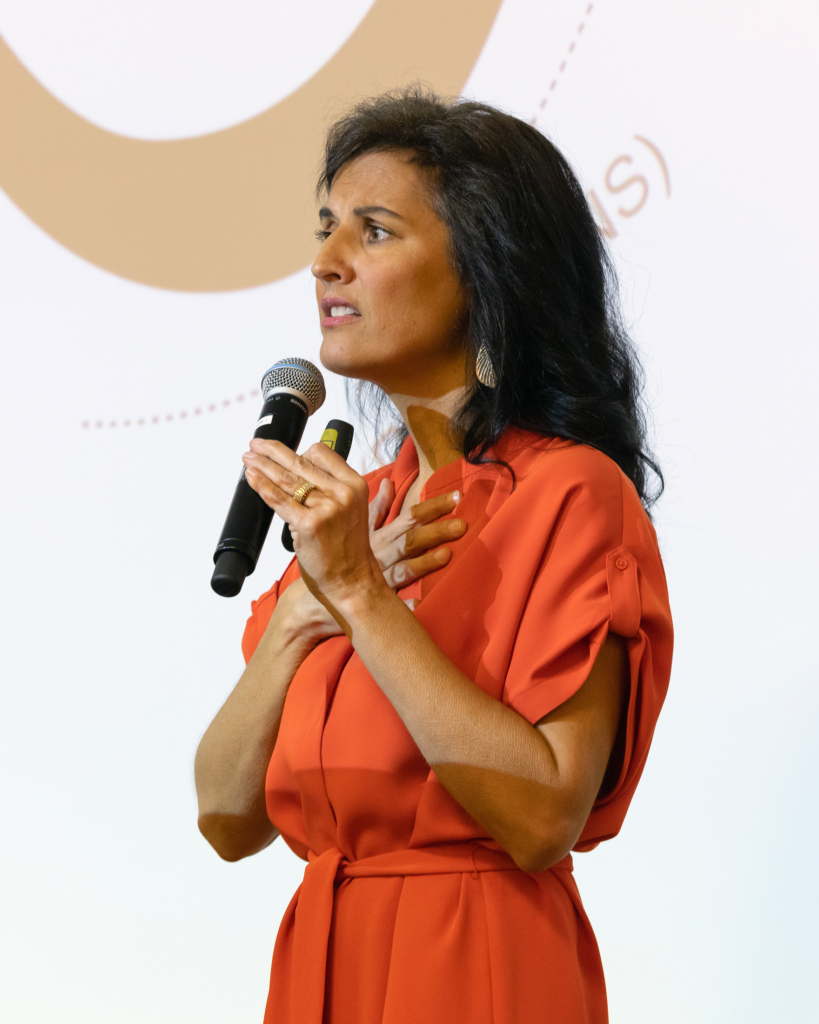“I see you. I hear you. And what you say matters.”
These words echoed through the Citizen Potawatomi Nation Cultural Heritage Center on Wednesday, Feb. 22 as attendees from a variety of backgrounds participated in Empathy and De-escalation Training sponsored by Citizen Potawatomi Nation Workforce Development & Social Services.
Three training sessions each began and ended with song as Oklahoma Baptist University Musical Arts major Brock Brown performed Stand By Me and Lean On Me.
During the first session, Brown made the spontaneous decision to have everyone join him in singing, something he continued in the other two sessions as well.
“That was just a spur of the moment thing,” he said. “I was like, ‘Nobody’s moving. I don’t like that.’ We need the interaction with one another.”
To offer tools for building empathy and de-escalation skills, CPN Safe and Stable Families Education Counselor Jamelle Payne invited Tracy Rader. She works for GiANT, a leadership development company that works with clients all over the world. The company has more than 900 certified coaches who teach leadership tools like the ones taught at the CHC.

Finding balance
During each session, Rader talked about what defines empathy and how to have a healthy balance – neither to be too empathetic and take on everyone’s troubles, nor to have an unempathetic “suck it up” attitude toward others.
In discussing some of the strategies, she said a good place to start learning empathy is to ask, “What is it like to be on the other side of you?” and to create a high-trust environment where a family member, coworker or friend would feel comfortable giving feedback.
One of the first strategies she discussed for finding a healthy balance of empathy was “know yourself to lead yourself.”
Rader said this lifelong strategy starts with being aware of things a person might want to change about themselves and then noting the tendencies and patterns that would need to change to improve that behavior.
For someone who wants to build empathy and connections, they might pencil in time in their calendar to connect with others. However, someone who tends to exhibit unhealthy amounts of empathy might limit the time they give to others to avoid burnout.
When things boil over
For de-escalation, Rader said people often don’t feel heard, valued or understood, especially if there are other factors at play, such as personal stress or mental health issues. When this happens, she gave these tips:
- Compassionately listen to what that person needs and what they’re feeling
- Give them personal space
- Use a gentle tone and body language
- Use the Communication Code to try to give them the form of communication they are looking for
The thought behind Rader’s Communication Code is that people often seek a specific type of feedback when speaking with others. The Communication Code breaks down five responsess people might desire: critique, collaborate, clarify, care or celebrate.
If someone has finished a big project and wants to celebrate, they may not appreciate critique, even with good intentions. By thinking about which of the five things is wanted before responding, a person can help avoid conflict.
“Every person walks in with baggage and hurt and trauma — and great things, too, to celebrate,” Rader said. “So, if you’ll just take the time to think outside of ourselves, ‘What’s happening in that person’s world?’ We could solve a lot of issues that are happening in this world if we could just be more empathetic toward one another.”
Something every department needs
Payne said the training was needed, and that was evidenced in part by the variety of people who showed up to learn — including representatives from schools in the area and Shawnee, Oklahoma, Mayor Ed Bolt, as well as several city employees, from those working with the unhoused to Visit Shawnee.
“It’s something every department needs, and that’s love. Because we know what it feels like to receive it, but sometimes we forget what it feels like to give it whenever someone else isn’t giving it to us,” Payne said.
Philisha Lowe, with 6-L Mechanical, took part in the training, and she said one of her favorite tools was thinking about how others see her.
“You never really think about it. I know how I see them or how I think I’m being, but how do they see me? What’s it like to be across from my desk? That stuck with me,” she said.
The empathy and de-escalation training is part of the CPN Lunch and Learn event series.
For more information about Workforce Development & Social Service, visit cpn.news/workforce or call 405-878-3854.
